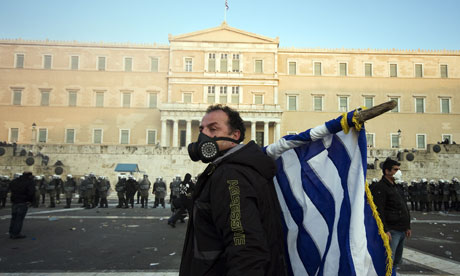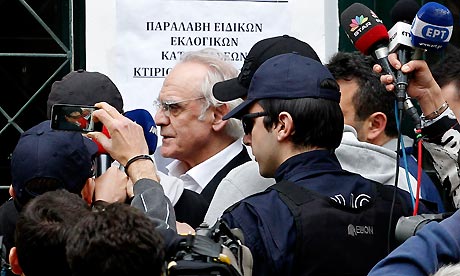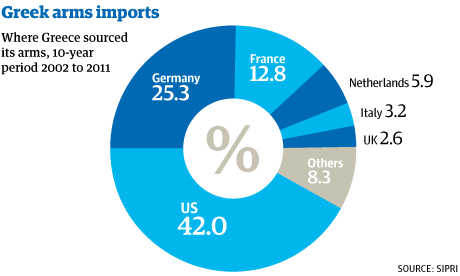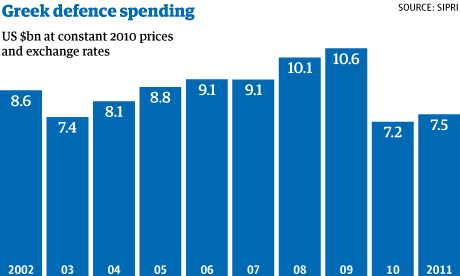By Nick Squires, Zakynthos
8:11PM BST 28 Apr 2012
Greece needs to crack down on benefit fraud, but on Zakynthos, the island of the blind, the crackdown has backfired for one politician

Fraudulent benefit claims, including bogus cases of leprosy, cost Greece €111 million last year, according to government statistics Photo: AP Photo/Thanassis Stavrakis
Even by the extravagant standards of Greek corruption, the scam uncovered by Stelios Bozikis is so brazen that it is hard to credit.
Nearly 600 people on the Ionian island of Zakynthos - of which Mr Bozikis was recently elected mayor - managed to have themselves falsely declared blind, entitling them to fat monthly cheques from the state.
They included taxi drivers, shopkeepers and restaurant owners, farmers tending the island's patchwork of vineyards and olive groves, and a few amateur hunters, whose purported disability did not stop them from spending their weekends shooting rabbits and birds in the rugged mountains of the interior.
Other "blind" locals have been seen cheerfully playing cards and backgammon in the tavernas and bars of the island. "Out of 650 registered blind people on the island, we estimate that at least 600 are fraudulent claims," the mayor told The Sunday Telegraph in his office overlooking the boats crowding the port of Zakynthos Town, the main settlement.
That represents nearly two per cent of the island's population of 35,000 - nearly 10 times the average rate of blindness in the rest of Europe, according to the World Health Organisation.
The surprisingly high prevalence was the result of authorities on the island permitting fraudulent claims for more than a decade.
"I realised when I became mayor that a lot of illegal things were taking place here," said Mr Bozikis, a lawyer who was elected last year. "I promised myself that I would tackle them, irrespective of the political cost."
The fake blind were raking in monthly payments of at least €350, sometimes more depending on their age and family status. Those who supposedly needed carers received larger sums.
The mayor, a member of the Socialist Pasok party, has suspended all benefit payments until it can be independently established exactly who needs a white cane.
The crackdown has encountered huge opposition, culminating in a recent council meeting which was stormed by around 50 angry benefit claimants, who chucked eggs and pots of yoghurt at the mayor in a uniquely Greek expression of anger.
"I consider it a badge of honour," said the mayor, sitting at his desk beneath an Orthodox image of St Dionysios, the patron saint of the island, which lies south of Corfu. "It meant that we are doing the right thing."
Known to the Venetians during the heyday of their trading empire as "the Flower of the Levant", Zakynthos has now been mockingly dubbed "the Island of the Blind" by the Greek media.
Mr Bozikis's crusade against graft is a microcosm of the immense problems of corruption, tax evasion and benefit fraud that Greece confronts as it tries to avoid being kicked out of the euro zone.
It is a scourge that whoever wins the country's general election - one of the most crucial in its post-war history - next Sunday will come under huge pressure to tackle, from the European Union and the International Monetary Fund, Greece's creditors. Yet the signs are that anti-austerity parties which oppose the clampdown on public spending are gaining in the polls.
At least 10 parties are expected to win seats under the country's electoral system and the likelihood is that, to keep Greece on track and deliver the further cuts needed over the next two years, the two traditional rival parties, New Democracy and Pasok, will be forced into coalition.
Fraudulent benefit claims, including bogus cases of leprosy, cost Greece €111 million last year, according to government statistics.
Nearly one in six disability allowances were found to be fraudulent after an investigation by the health ministry, and last week the labour ministry announced that benefits had been stopped to 200,000 people who either lied to get their cheques or were long since dead.
There have been cases of multiple maternity benefit payments to women who have never had children.
The phenomenon of hundreds of fake blind people on Zakynthos could be the result of a typically Greek system of kickbacks and corrupt political patronage. The mayor claimed it was the head ophthalmologist at the local hospital, Nikolaos Vartzelis, who falsely diagnosed people as blind in exchange for money.
Their claims were allegedly signed off by Dionysios Gasparos, then the governor of the island, in exchange for votes.
Both men have denied the allegations but are being investigated by the health ministry.
Dr Vartzelis, who stepped down from his post last month, said he had been "lenient, but within the limits of the law" towards people who "didn't have bread to eat" and desperately needed extra income.
He accused the mayor of playing "political games" by levelling the accusations against him, in an attempt to undermine Mr Gasparos, who is running as a candidate for the conservative New Democracy party next weekend.
Dr Vartzelis conceded that he had signed some blind disability applications but said others had been approved by an unnamed second opthalmologist on the island.
Mr Gasparos blamed the doctor for the scandal. "I have nothing to do with this. It's not me who registers you as blind, it's the ophthalmologist," he said.
A 35-year-old taxi driver who pretended to be blind to draw a monthly disability allowance "bragged" about his ability to cheat the welfare system, according to a taxi-driver colleague. "He was bragging about it around the island," said Yianni, 33, a who declined to give his surname.
"But now that they've all been found out, he hasn't been since - he's hiding at home. It's very awkward for his parents. It wasn't right but if someone offers you that money, you'd be silly not to take it."
No one has been more angered than the island's 40 or so genuinely blind people. "What makes me really, really mad is that I am blind and these people are laughing in my face by taking disability allowances," said John Venardos, 50, who began to go blind a decade ago as a result of a genetic trait that runs in his family.
Mr Venardos, who does his best to run a family-owned hotel on the beach despite the loss of his sight, said the scam was symptomatic of the venality and corruption which have eaten away at Greece like a cancer. "People think 'Why should my next door get false benefit payments and not me?' Corruption starts at the top - government ministers are doing it, mayors do it, they all screw the system."
Born in Canada but now settled on Zakynthos, he said the scam had brought shame and embarrassment to the island. "They are calling us 'the island of the blind'. When I go to Athens I'm afraid to say I'm from Zakynthos and walk down the street with a white stick because people will say I'm faking it."
His 75-year-old father, Nikolaos Venardos, is also suffering from the genetic disorder - he started to lose his sight a few years ago and is now 85 per cent blind. "I feel embarrassed to be Greek. Seven hundred blind people on a tiny island like this? Come on, it's ridiculous. I deserve my benefit payments, but those people are driving cars and leading normal lives," he said.
The scandal on Zakynthos - which the mayor estimates has cost the island €2 million a year for the last decade - represents just a fraction of the abuses which are rampant across Greece.
Tax evasion is endemic, the awarding of public contracts is often corrupt, and the practise of offering "fakelaki" - which translates literally as "little envelope" but in reality means a bribe - is widespread.
Together they have conspired to drag down the Greek economy, now in its fifth consecutive year of deep recession.
Greece was ranked 80th out of 183 countries in Transparency International's 2011 corruption perceptions index, below countries like Cuba, Tunisia, China and Saudi Arabia. In the European Union, only Bulgaria ranked lower.
"The long-standing acceptance of corruption, and fatalism about the chances of preventing or resisting it, drives petty wrongdoing," the anti-corruption watchdog said in its most recent report on Greece. "When people believe that their leaders and officials exploit their authority with impunity, they are more likely to act along similar lines in their own lives."
Sixty per cent of Greeks expect public officials to abuse their position for financial gain, said Transparency International.
"There needs to be a wholesale clean up of the system in Greece, rather than chipping away at bits and pieces here and there," said Chara Xyrogiannopoulou, 55, in her waterfront bar in Zakynthos Town.
"I'm not sure how successful the mayor will be," said Nikos Stamiris, 52, serving tsatsiki and roast lamb at his taverna in a square lined with lemon trees and palms. "Others tried to do the same but in the end just gave up."
"The problem is not that people are crooks, it's that the whole system is sick," said Spiros Skiadopoulos, 63, a businessman from Zakynthos who runs a photography college in Athens.
"Everybody is corrupt in Greece - the lawyers, the doctors, the judicial system, police, customs - everybody. Why are our European partners now so surprised by this? They knew all along, right from when they allowed Greece into the EU.
"We need to change our whole mentality. The Germans and everyone else need to come here and be aggressive in making us change. If they think we are the devil of Europe, they must throw us out."
It is a stark choice that the mayor, too, believes Greece faces as it teeters on the edge of economic oblivion and social chaos.
"Greece can change but only if the politicians in Athens start to change and to set a good example," said Mr Bozikis.
"There are two Greeces at the moment - one that wants to stick with the old system of backhanders and corruption, and one that wants to move forward. To do the latter, we need to change everything."
Greece tries to crack down on fraud as mayor of Zakynthos faces revolt - Telegraph
![The [Greek] European Tragedy](https://blogger.googleusercontent.com/img/b/R29vZ2xl/AVvXsEiWKI5s90SFm1wWTk6bs4p7CgslaC2SnYPsrZhb-B-smOufNNCSxCvpBLI9hOB-LsXZjir_PNmEiMk2-E62F3xkg96IoC6QFAaZAnPRTVH340IN9WBRmWJqPkjWlgyRj3zpALp7h6hvA58/s920/GkBack_new.jpg)










